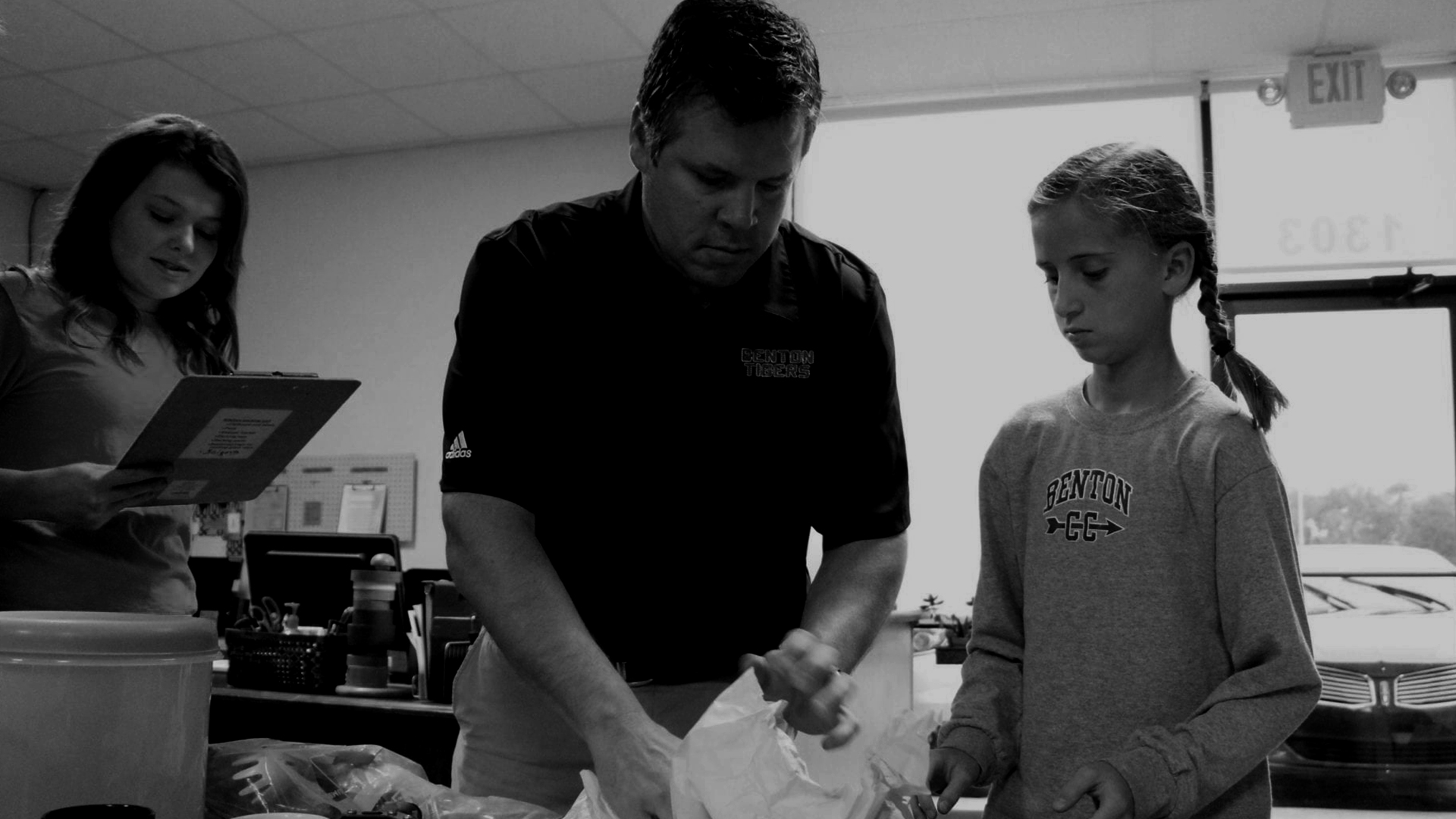Dr. Kyle Machen, EdD, an educator for close to 20 years and the son of two widely-acclaimed educator parents, currently serves as the principal of Benton Middle School in Benton, Louisiana. Kyle and his wife, Lori (also an educator), have three amazing teenage daughters.
Under Dr. Machen’s leadership, Benton Middle School accomplished something no other school in Louisiana has done before and is being recognized on a national stage for its achievement, according to a press release. BMS attained the distinction as a “Model Professional Learning Community,” one of only 132 schools in the United States to reach this educational pinnacle and the first in the state.
The school was chosen as Louisiana’s first “Model Professional Learning Community” after participation in a national PLC review panel that assesses a school’s overall commitment, successful implementation, and achievement of PLC core concept for at least three years.
Dr. Machen and Stuart have an inspiring conversation regarding Kyle’s perspective on responsibility and leadership, how to lead with excellence while following the way of Jesus, and helping the next generation of leaders be leaders worth following. This was a great listen!

Who is the best teacher you’ve ever had?
Maybe they taught you world history, maybe they taught you how to write better essays, or maybe they taught you how to count to 100 in French. No matter who you are thinking of, it is almost a lock that your favorite teacher made learning enjoyable, that they respected you, and that they believed in you. It is also a lock that because of this, you trusted them. You let them change your mind. You grew.
We sorely need more great teachers in this world. But not for the reasons most people think we do.
Beyond the need for us all to help close the growing skills gap, over 50% of Americans believe in at least one conspiracy theory, 40% of white Americans still hold varying forms of racism, and nearly a third of Americans still don’t believe in climate change.
Truth has become a leaf in the wind, it seems.
Read the story of Moses’ call to leadership in Exodus 3:1–4:17. Notice some of Moses’ feelings and concerns that you may feel when considering teaching or leading. God’s challenge to you to lead may not be as flashy as Moses’ call through a burning bush, but God’s invitation to you and God’s promise of support are just as strong as they were in the time of Moses.
Like Moses, your first reaction may be reluctance or fear. That’s normal. When God gives us a task, it can seem overwhelming and we may feel ill-equipped. Moses even had the gall to argue with God and pointed out all of his own personal shortcomings. God assured Moses that his gifts were sufficient and that help would arrive when needed. Like Moses, you can be assured that God will use whatever skills you have and that you will find the help you need to be an impactful leader.
Simply canceling people whose opinions we don’t agree with, or expecting social media companies to curb the spread of misinformation, is not going to do the trick. We need great teachers — not just in K12 classrooms and higher education institutions — but in workplaces and on the streets.
Learning shouldn’t end when we finish formal education. Journalists are teachers. Designers are teachers. The best artists and authors and actors are teachers. You too should see yourself as a teacher.
We all have daily opportunities to truly teach others.
Is there a pull in your heart to teach or lead? What do you normally do with that pull? How do you think of the very idea of teaching?
Let’s discuss this in the Circle…

In this Episode’s Version, INFLUNSR. asked you to read an excerpt from a 2015 article The Greatest Story Ever Told? by Jonathan Merritt regarding the fact that, during the month of December, more than 100 million Americans will gather in church buildings and around coffee tables to hear the story of Jesus’s birth as recorded in the New Testament. They do this year after year after year, and somehow it never gets old.
Indeed, generations of people have been enraptured by this story—not just because of what happens in the narrative itself, but also because of what happens inside many of them when they hear it. It stokes the fires of belief, opening their minds to the possibility of transcendence and supernaturalism. It generates faith in humanity’s ability to endure bravely amid difficulty and God’s ability to save humanity when their efforts are not sufficient to save themselves. No wonder the Christmas story has persisted for two millennium.
“The best stories endure through the ages,” Buster says, “and in the end, that’s how you know if it is really a great story or not.”
The Christmas story is full of God’s use of the unexpected to change our world, beginning with the fact that God came to us. That Christmas is now such a long-standing tradition can make it difficult to remember all that is unusual or surprising about it. Yet when we take time to explore the story in more detail, there are many surprising features, the primary one being that God became man.
What’s your favorite “unexpected” detail in the Christmas story?
What’s one unexpected way God has worked in your life lately?
Why did the Son of God have to come to earth?
Let’s dive into this in the Circle…

We asked you to watch The Rescue, National Geographic’s chronicles of the enthralling, against-all-odds story that transfixed the world in 2018: the daring rescue of twelve boys and their coach from deep inside a flooded cave in Northern Thailand. Academy Award®-winning directors and producers E. Chai Vasarhelyi and Jimmy Chin keep viewers on the edge of their seats as they use a wealth of never-before-seen material and exclusive interviews to piece together the high stakes mission, highlighting the efforts of the Royal Thai Navy SEALs and U.S. Air Force Special Tactics and details the expert cave divers’ audacious venture to dive the boys to safety.
What role did perseverance, integrity, courage, self-control, respect, and humility play as the team worked to accomplish this daunting goal? How does The Rescue show that these are crucial life skills and character strengths?
What is moral courage, and how is it demonstrated in the film? What was the additional risk taken on by Dr. Richard “Harry” Harris? What do you think you would have done if you were in his shoes? Talk about John Volanthen’s explanation of how he’s able to control his fears. How do you get through difficult or scary situations? What childhood events and personality traits helped lead the rescuers to cave diving? Think about your skills and personality traits, and imagine how they could be helpful in an emergency or heroic endeavor. How does the film show the human effort that allowed this rescue to occur, as well as the role that spirituality played in accomplishing this amazing feat? How did the filmmakers show that it’s important to respect others’ culture and not charge in with our own belief structure?
Now, consider John 12:46 (NLT):
“I have come as a light to shine in this dark world, so that all who put their trust in me will no longer remain in the dark.”
Jesus came to earth, leaving His rightful place to bring light into a dark world. How does the nuclear thread of Jesus’ mission and the tangible scenes of The Rescue move you this Christmas season?
Let’s discuss this in the Circle…

We asked you to read Pastor Acher Niyonizigiye’s Christianity Today article Joseph’s Simplicity Was Actually Spiritual Maturity.
Pastor Acher Niyonizigiye writes, “Today, the world is in some ways better than it was during Joseph’s time. Human rights organizations can speak for the weak and help protect their lives. However, humanity is still fallen and, therefore, far less than perfect. The number of forcibly displaced people in the world has risen to a 40-year high. Wars, earthquakes, volcanic eruptions, hurricanes, pandemics, and the decisions of rulers can destroy our sense of safety and stability.
That said, we should never forget that God is at work and that he is with us even at our darkest hour (Ps. 23:4–5). Besides, he has promised to instruct us in the way we should go (Ps. 32:8) as instruments of his will on earth.
As God used Joseph, so does he intend to use us to carry out his purposes for our generation. But this requires of us the kind of spirituality that transcends denominational traditions and legalistic mindsets.” How do you develop humble confidence and courage like Joseph’s?
Let’s discuss this in the Circle…

We asked you to watch the TedTalk by Jose Miguel Sokoloff How Christmas Lights Helped Guerrillas Put Down Their Guns.
Gigantic trees were placed in nine strategic pathways in the Columbian jungle covered with Christmas lights. These trees helped demobilize 331 guerrillas, roughly five percent of the guerrilla force at the time. These trees were lit up at night, and they had a sign beside them that said, “If Christmas can come to the jungle, you can come home. Demobilize. At Christmas, everything is possible.”
How do you think the hope of Christmas stretches to the jungles of Columbia? What is it about the message of Christmas? What does Christmas mean to you?
Time to dive into this in the Circle…

We asked you to read a New Yorker story by Joseph Mitchell from 1938.
C.S. Lewis once wrote, “We must picture Hell as a state where everyone is perpetually concerned about his own dignity and advancement, where everyone has a grievance, and where everyone lives the deadly serious passions of envy, self-importance, and resentment.”
How does this Christmas story from 1938 speak to how fundamental human dignity differs from position, materialism and gain? As a next generation leader, how should you view every single human being you come in contact with? Is there a difference between pity and empathy? If so, what is that difference?
Let’s discuss this in the Circle…

We asked you to read a Vanity Fair article by Sam Kashner How A Christmas Story Went from Low-Budget Fluke to an American Tradition.
It all started when screenplay writer Bob Clark was in Miami driving to pick up his date, and he heard Shepherd on the radio telling the story of Flick, a boy who is triple-dog-dared into putting his tongue on a metal pole in the dead of winter, instantly freezing it to the pole. Clark had never heard a story told quite like that. He was so enthralled he was 45 minutes late for his date, just circling the block to hear the rest of the story. He resolved right then, “I will do a movie of this man’s work.” It took 12 years.
“I’ve seen five-year-old kids squat down in front of the TV and not talk while they’re watching it. There’s no song from Frozen, there’s no dancing, no talking reindeer or snowman. It’s kids, in a time when that five-year-old doesn’t care if it’s a little white boy or girl, little black boy or girl, Hispanic, Asian, Jewish—it doesn’t matter: they don’t care. They’re watching it because that’s their family.”
How do you balance the realities of imperfect family and friends with what Hollywood tends to sell as Christmas reality? How does A Christmas Story connect to the realities of the first Christmas and all its imperfections?
Let’s dive into this in the Circle…

Disclaimer:
INFLUNSR’s mission is to fuel the next generation of leaders worth following and to help students learn how to think, not what to think. Any articles posted and questions asked are intended for that sole purpose.



